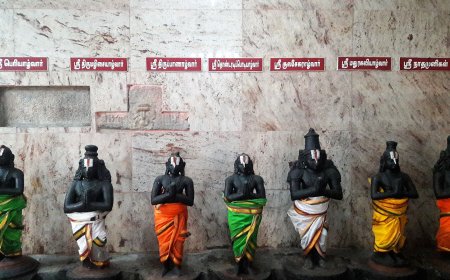The Alvars, a group of 12 revered saint-poets from Tamil Nadu, are celebrated for their profound devotion to Lord Vishnu and their significant contributions to the Bhakti movement. Flourishing between the 6th and 9th centuries CE, their hymns and songs exalt the virtues of Vishnu and his incarnations, especially Krishna and Rama. Despite their immense impact on the spiritual and cultural heritage of South India, the Alvars often remain overshadowed in the broader narrative of Indian religious history.
Hailing from various social backgrounds, the Alvars included kings and humble peasants, reflecting the inclusive nature of the Bhakti movement. Some of the most renowned Alvars include:
- Poigai Alvar: Considered the earliest of the Alvars, known for his philosophically rich hymns.
- Bhoothath Alvar: Emphasized the emotional dimensions of devotion in his verses.
- Pey Alvar: Renowned for his mystical and visionary poetry.
- Nammalvar: The most prolific and influential Alvar, whose works are foundational to Vaishnavite theology.
- Andal: The only female Alvar, celebrated for her passionate devotion to Lord Vishnu and her literary masterpiece, the *Tiruppavai*.
The lives of the Alvars were marked by miraculous events and deep spiritual experiences, expressed powerfully through their devotional poetry.
What Did They Do?
The Alvars produced a rich body of devotional literature known as the *Divya Prabandham*, which consists of approximately 4,000 Tamil verses. This anthology is divided into several texts, each focusing on different aspects of Vishnu's divine play and the relationship between the devotee and the divine. Key works include:
- Tiruvaymoli by Nammalvar: Often called the Tamil Veda, celebrated for its philosophical insights and passionate devotion.
- Tiruppavai by Andal: A collection of 30 verses sung during the Tamil month of Margazhi, highlighting the simplicity and purity of devotion.
The hymns of the Alvars were not merely expressions of personal devotion; they also served as theological discourses, laying the groundwork for the Sri Vaishnavism tradition.
Why Are They Important?
The contributions of the Alvars are multifaceted:
- Spiritual Influence: They democratized spirituality, making it accessible to people from all social backgrounds. Their teachings emphasized personal devotion and a direct connection with God, bypassing rigid rituals and caste divisions.
- Cultural Impact: The hymns of the Alvars enriched Tamil literature and culture. Their works are enduring classics that continue to be recited in Vaishnavite temples and households.
- Theological Contributions: Their poetry established the philosophical and theological foundations of Sri Vaishnavism, shaping the ideas of later theologians like Ramanuja.
Why Are They Forgotten?
Despite their profound influence, the Alvars are less recognized today for several reasons:
- Regional Focus: Much like the Nayanars, the Alvars’ impact was primarily confined to Tamil Nadu. This regional emphasis has contributed to their limited recognition on a national scale.
- Modern Shifts: The rise of modern education and a focus on global culture often sideline traditional and regional spiritual figures.
The teachings and lives of the Alvars remain deeply relevant. In an era where materialism frequently overshadows spirituality, their emphasis on pure devotion and ethical living offers timeless guidance. Their hymns advocating love, humility, and compassion can inspire contemporary society to foster deeper spiritual connections and promote social harmony.
To ensure the legacy of the Alvars endures, initiatives are underway to revive interest in their works. These include translating their hymns into various languages, integrating their teachings into educational curricula, and organizing cultural festivals to celebrate their contributions.
REGARDING THE POST
Please note that the views expressed in this article are not my own, but rather are a generic view which is present on the internet already or, is a representation of someone else's perspectives as mentioned in the article. I appreciate your understanding and thank you for reading my blog, where I strive to maintain a respectful and inclusive environment. Thank You!



 Ritesh Kushwaha
Ritesh Kushwaha